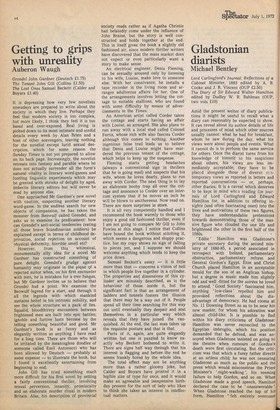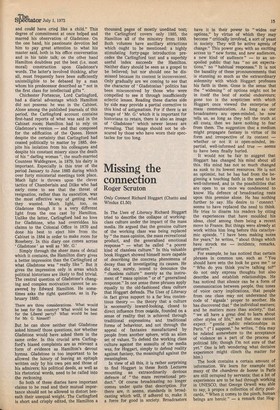Gladstonian diarists
Michael Bentley
Lord Carlingford's Journal: Reflections of a Cabinet Minister, 1885 edited by A. B. Cooke and J. R. Vincent (OUP £2.50) The Diary of Sir Edward Walter Hamilton edited by Dudley W. R. Bahlman (OUP, two vols £10) Amid the present welter of diary publications it might be useful to recall what a diary can reasonably be expected to show. It can reveal about its author details of life and processes of mind which other sources usually cannot: what he had for breakfast, whom he saw during the day, what his views were about people and events. What it cannot do is to perform the same service for others. Once the diarist turns from his knowledge of himself to his suspicions about others, his views are less immediately acceptable; they have to be placcd alongside those of diverse ccntemporary views as reported in letters and reported conversations — or, perhaps, other diaries. It is a caveat which deserves to be kept in mind whcn reading t'ae journals of Lord Carlingford and Edward Hamilton for, in addition to offering insights (and often fascinating ones) into the lives and motivations of these two figures, they have understandable pretensions towards demonstrating those of the massive figure who clouded the one life and brightened the other in the first half of the 1880s.
' Eddie ' Hamilton was Gladstone's private secretary during the second ministry of 1880-85, a period associated in retrospect with Ireland, parliamentary obstruction, parliamentary reform and General Gordon's Egypt. Eton and Christ Church placed Hamilton in an acceptable mould for the son of an Anglican bishop, but a degree in music made him slightly odd and well -fitted for the soirees he loved to attend. 'Good Society' fascinated him, anything ' low-class ' repelled him and provoked reflections about the disadvantage of democracy. He had rooms at No. 11 Downing Street so as to be near his new master, for whom his adoration was almost child-like. It is possible to find within his diary criticisms of Gladstone: Hamilton was never reconciled to the Egyptian imbroglio, which his position demanded that he defend, and was annoyed when Gladstone insisted on going to the theatre when rumours of Gordon's death were first circulating. But the criticism was that which a fussy father directs at an artless child; he was not censuring Gladstone so much as the public and the press which would misconstrue the Prime Minister's night-walking ', his seeming failure to help Gordon, and so on. When Gladstone made a good speech, Hamilton declared the case to be ' unanswerable '. When Gladstone reached the top of his form, Hamilton "felt entirely overcome and could have cried like a child." This degree of commitment at once helped and marred his observation of Gladstone. On the one hand, his passionate devotion led him to pay great attention to what his master said, both in his office conversation and in his table talk; on the other hand Hamilton doubtless put the best (i.e. most moral) construction upon Gladstone's words. The latter's involved thinking, after all, must frequently have been sufficiently unintelligible to be debased by a man whom his predecessor described as "not in the first class for intellectual gifts ".
Chichester Fortescue, Lord Carlingford, had a diarial advantage which Hamilton did not possess: he was in the Cabinet. Alone among the published journals of this period, the Carlingford account contains first-hand reports of what was said in the Cabinet room; Hamilton had to rely on Gladstone's version — and that composed for the edification of the Queen. Hence despite the certainty that Carlingford had ceased politically to matter by 1885, despite his isolation from his colleagues and despite his constant misery since the death of his "darling woman ", the muc'h-married Countess Waldegrave, in 1879, his dairy is important. Especially is this true of the period January to June 1885 during which over forty ministerial meetings took place. Much light is thrown upon the clever tactics of Chamberlain and Dilke who had early come to see that the threat of resignation, rather than its execution, was the most effective way of getting what they wanted. Much light, too, on Gladstone though it is a very different light from the one cast by Hamilton. Unlike the latter, Carlingford had no love for Gladstone, who had overridden his claims to the Colonial Office in 1870 and done his best to eject him from the Cabinet in 1884 in order to make room for Rosebery. In this diary one comes across ' Gladstone ' as well as 'Mr. G.'
Simply through the sheer mass of detail which it contains, the Hamilton diary gives a better impression than the Carlingford of what Gladstone was "really like ". But it gives the impression only in areas which political historians are likely to find trivial. The central question of Gladstone's changing and complex motivation cannot be answered by Edward Hamilton. He sometimes asks the right questions, as in February 1885: There are three considerations. What would be best for the country? What would be best for the Liberal party? What would be best for Mr. G. himself?
But he can show neither that Gladstone asked himself those questions, nor whether Gladstone would have asked them in the same order. In this crucial area Carlingford's biased complaints are as relevant a form of evidence as Hamilton's devout hymns. Gladstone is too important to be allowed the luxury of leaving an epitaph written only by his own pen and those of his admirers; his political deeds, as well as his rhetorical words, need to be called into the reckoning.
So both of these diaries have important claims to be read and their mutual importance should not be allowed to distort beneath their unequal weight. The Carlingford is short and crisply edited, the Hamilton a thousand pages of mostly unedited text; the Carlingford covers only 1885, the Hamilton all of the ministry from 1880. Both volumes have ancillary attractions which ought to be mentioned: a highly stimulating forty-page introduction precedes the Carlingford text and a superbly useful index succeeds the Hamilton. Neither diary should be seen as a gospel to be believed; but nor should one be dismissed because its content is inconvenient. Only gradually are we coming to see that the character of ' Gladstonian ' politics has been misconceived by those who were compelled to see it through insufficiently eclectic lenses. Reading these diaries side by side may provide a partial corrective to this kind of astigmatism. For if there is an image of 'Mr. G.' which it is important for historians to retain, there is also an image of ' Gladstone ' which newer lenses are revealing. That image should not be obscured by those who have worn their spectacles for too long.























































 Previous page
Previous page